
Historically, the southern edge of the kingdoms of Israel and Judah was the city of Beer Sheba. This city located at the edge of the southern desert was one of the last places in the land that had enough water to sustain a permanent settlement. That said, for much of the year, the only available water source was a well. The well at Beer Sheba (Literally Well of Seven) actually has a fascinating history, which can be found in the book of Genesis.
After the birth of Isaac, Abimelech, king of the region, approaches Abraham, seeking to make a treaty. Now these two have a bit of a complex history, Abimelech almost took Sarah as a concubine, unaware that she was Abraham’s wife. God had to intervene. So now Abimelech knows that Abraham is a prophet, chosen by God, and that Abraham is also wealthy and powerful. It’s in his best interest to make an alliance between Abraham and himself. Abraham, who is a stranger in the land, can also use some allies. As they make the alliance, Abraham mentions that some of Abimelech’s subjects had seized control of a well which he had dug.
When Abraham reproved Abimelech about a well of water that Abimelech’s servants had seized, Abimelech said, “I do not know who has done this thing; you did not tell me, and I have not heard of it until today.” So Abraham took sheep and oxen and gave them to Abimelech, and the two men made a covenant. Abraham set seven ewe lambs of the flock apart. And Abimelech said to Abraham, “What is the meaning of these seven ewe lambs that you have set apart?” He said, “These seven ewe lambs you will take from my hand, that this may be a witness for me that I dug this well.” Therefore that place was called Beersheba, because there both of them swore an oath.
Genesis 21:25-31
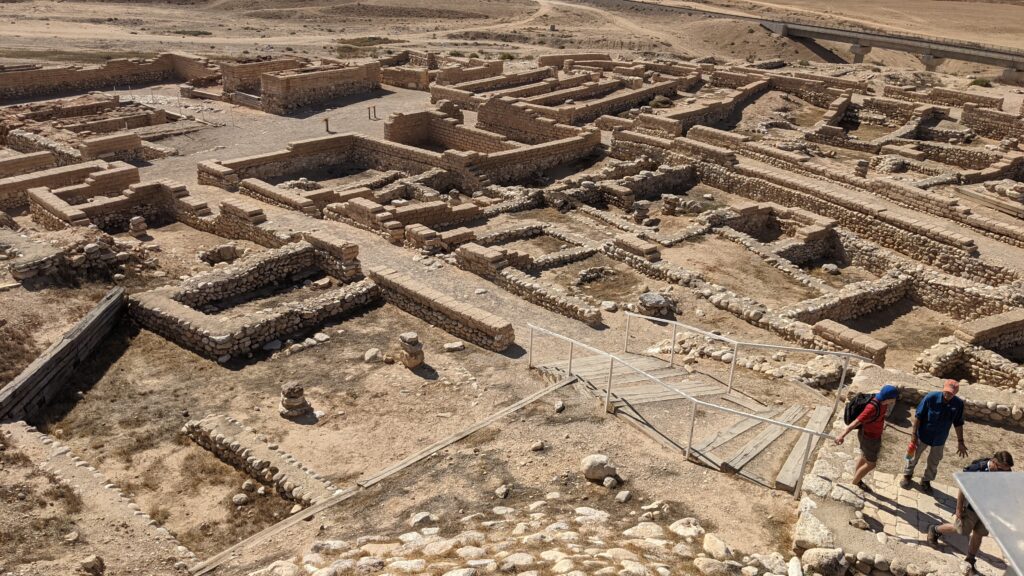
The Ruins of Beer Sheba 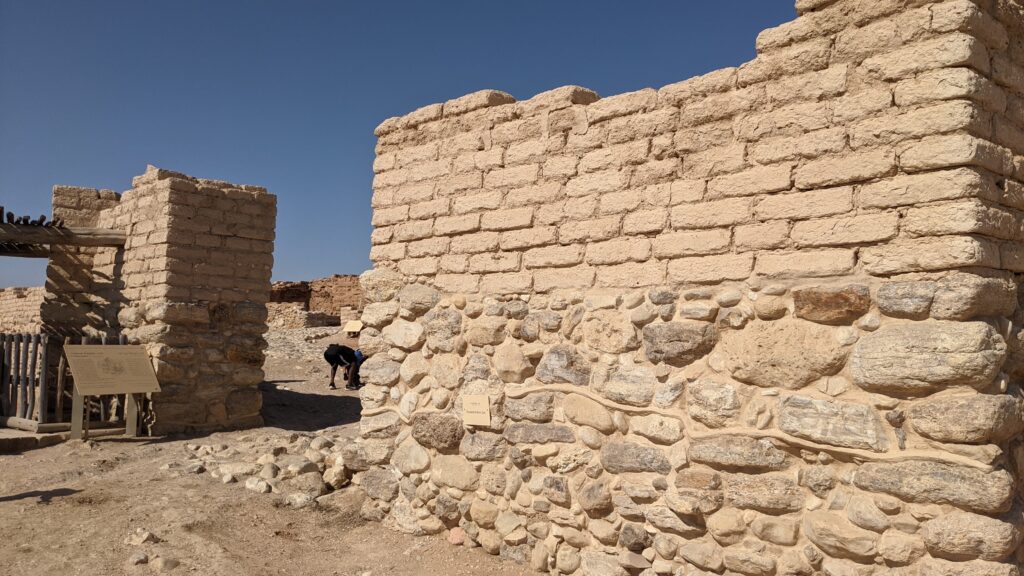
Gates of Beer Sheba 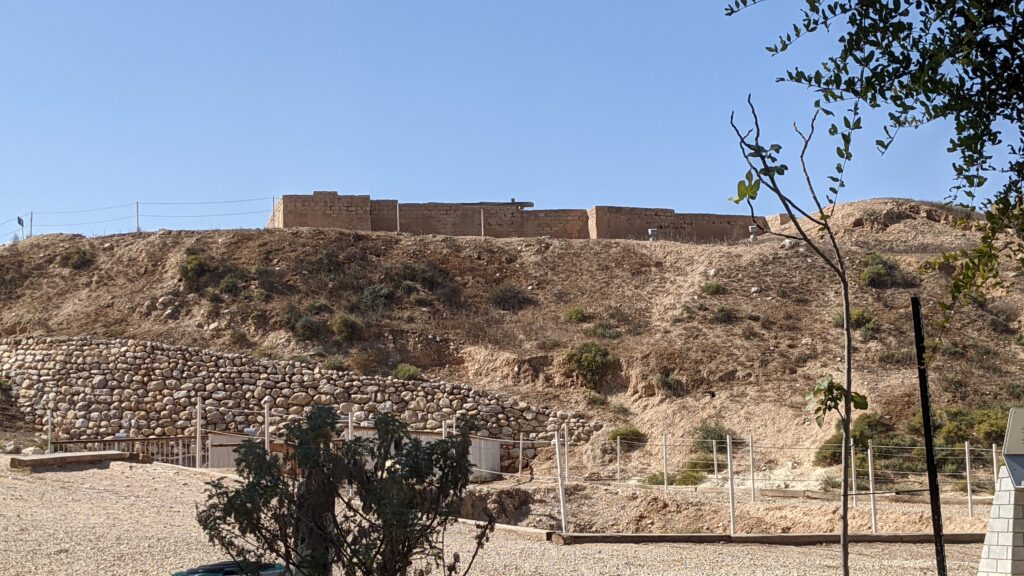
City of Beer Sheba 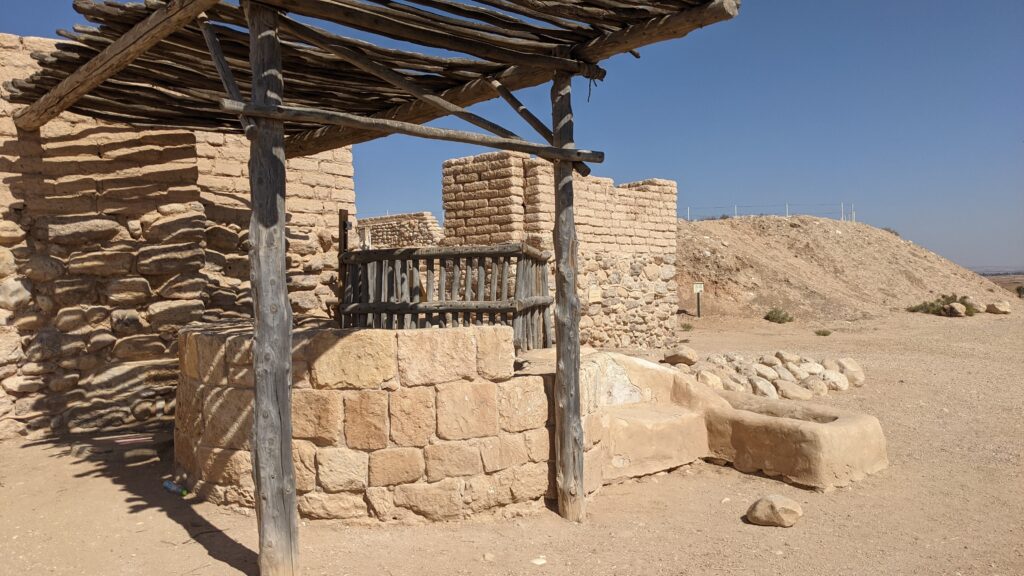
The Well of Beer Sheba 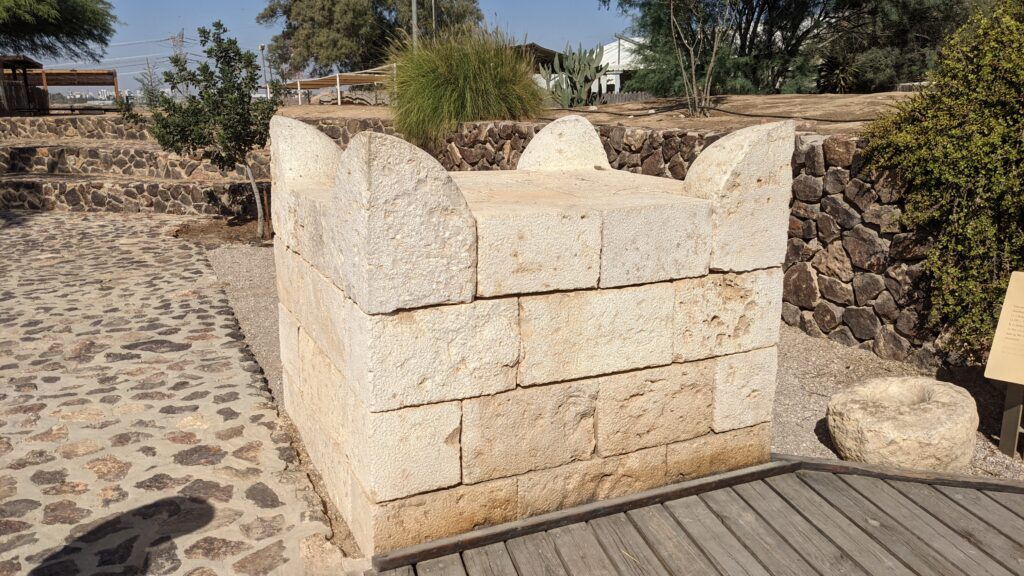
An Altar Found at Beer Sheba
Abraham Isaac and Jacob all spent significant portions of their life within the vicinity of Beer Sheba. Isaac was actually born here, and later in life had to re-dig the well after it was filled in. Here Isaac built an altar to the Lord, and renewed the allegiance with Abimelech, and continued to seek the promise of God to Abraham.
God’s promises sometimes take a long time to be fulfilled. Abraham was over 100 years old before his promised son, Isaac, was born, and the Larger aspect of God’s plan, that Abraham’s children would inherit the promised land, took over 400 years before it was fulfilled. During that time, the children of Israel had been enslaved in Egypt. It was God’s power that freed the Israelites, and His servant, Moses, led the Israelites on a journey to the promised land. Their journey led them through some of the most desolate land in the world, where only God could provide for them. It is likely they spent time in places like Makhtesh Ramon, located in the southern wilderness of modern Israel.
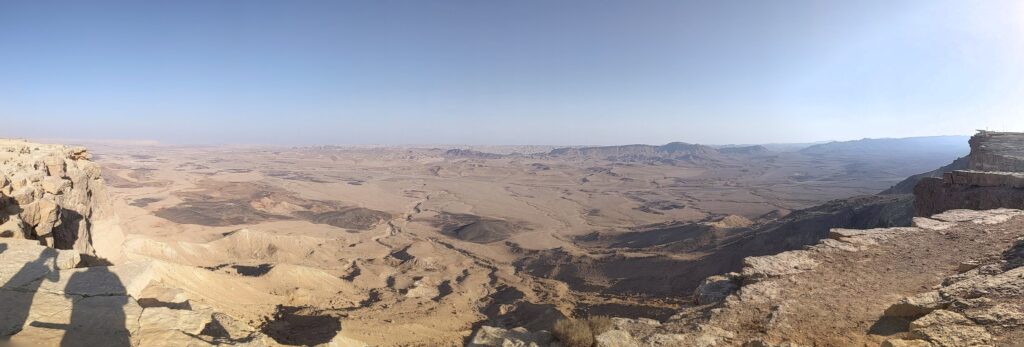
However what could have been a two week trip from Sinai to the Promised Land ended up taking 40 years. The Israelites sent spies into the promised land to scout it out, and the spies came back with a cluster of grapes so big it had to be carried on a pole between some of them among other fruit of the land, and gave the following report:
And they told him, “We came to the land to which you sent us. It flows with milk and honey, and this is its fruit. However, the people who dwell in the land are strong, and the cities are fortified and very large. And besides, we saw the descendants of Anak there.”
Numbers 13:27-28
According to tradition Anak was a Giant, and the children of Anak were a race of giants (Goliath was likely related to Anak). This report frightened the people of Israel, and they failed to have faith in God for victory. Never mind that God had miraculously saved them from Egypt, parted the Red Sea, and was providing bread from Heaven on a daily basis. As a punishment for their lack of trust in His promises, God forbade anyone from that generation to enter the promise land, except for Joshua and Caleb, the only two of the spies that had faith. Everyone else was forced to wander in the desolate wilderness for 40 years, until that generation died.
This time of wandering was full of strife and problems: Some Israelites tried to take the land anyway, now without God’s support, and were defeated. An entire clan of Levites, the Korahites, challenged Moses’s authority, and were swallowed by the Earth, which led more people to rebel, until nearly 15,000 of them had died via a plague. Moses’s brother Aaron’s authority was challenged until a miracle proved that God had chosen him to be High Priest and Miriam, Moses’s sister died. By the time they reached the wilderness of Zin, Moses had dealt with some of the most trying circumstances since they left Egypt. Perhaps that helps explain this moment of weakness.
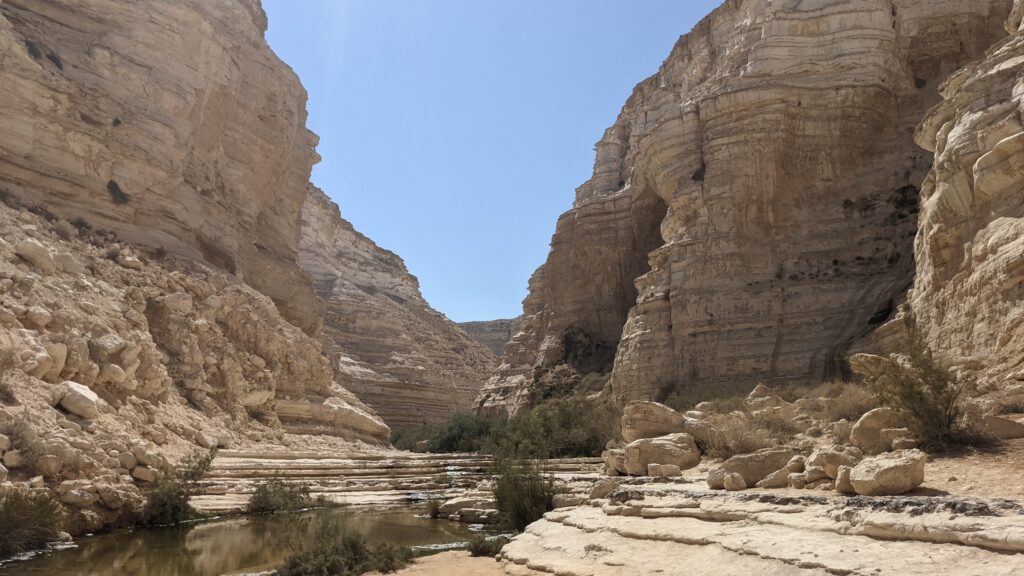
Ein Akev Canyon 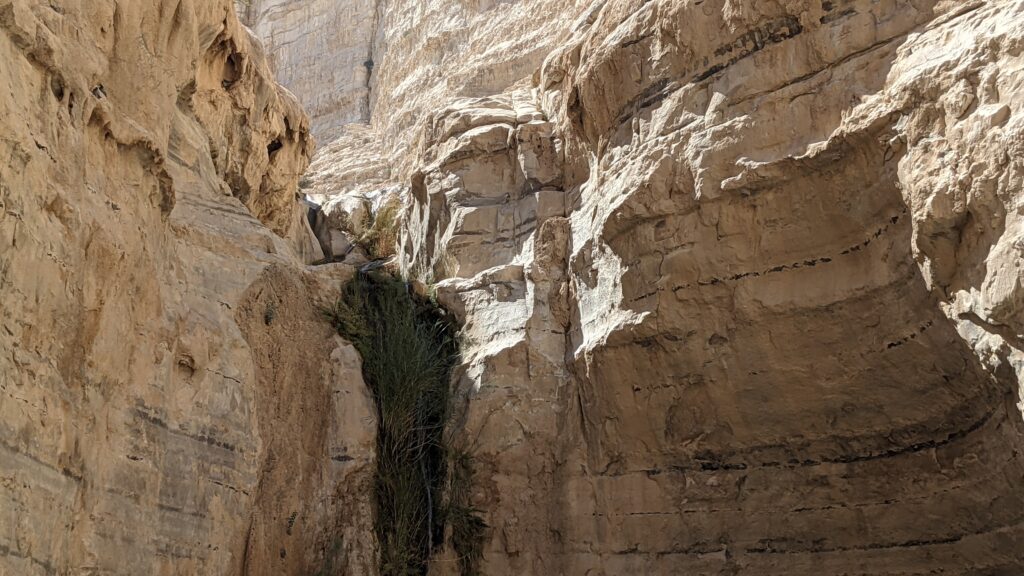
Ein Akev Waterfall (The Spring of Meribah) 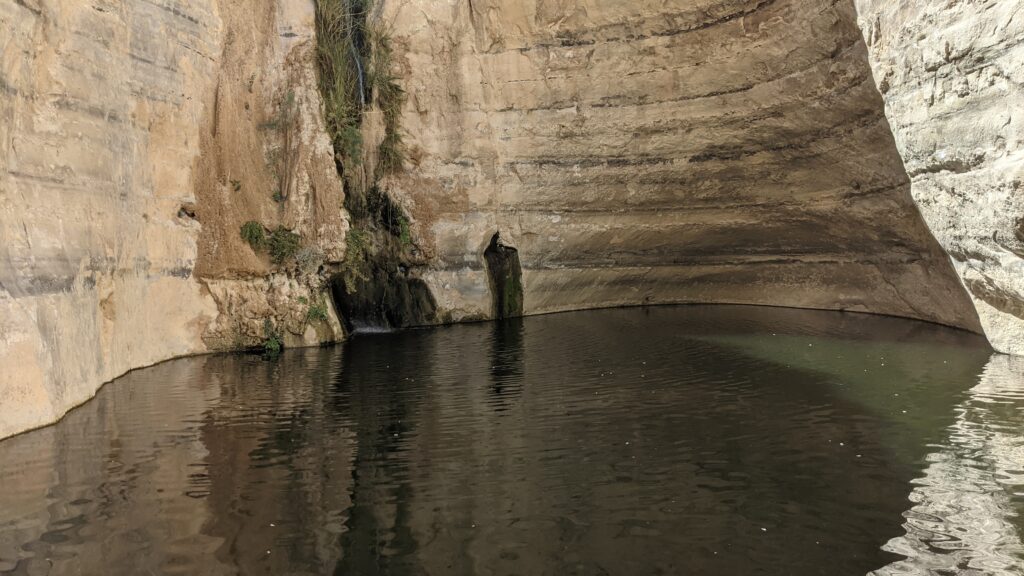
The Pool of Meribah 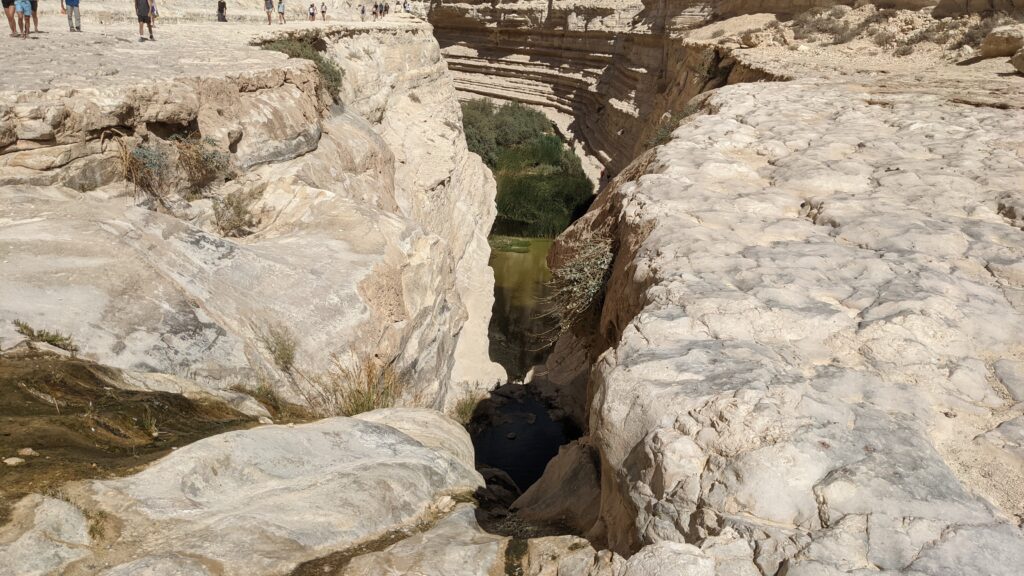
The Canyon from Above the Waterfall 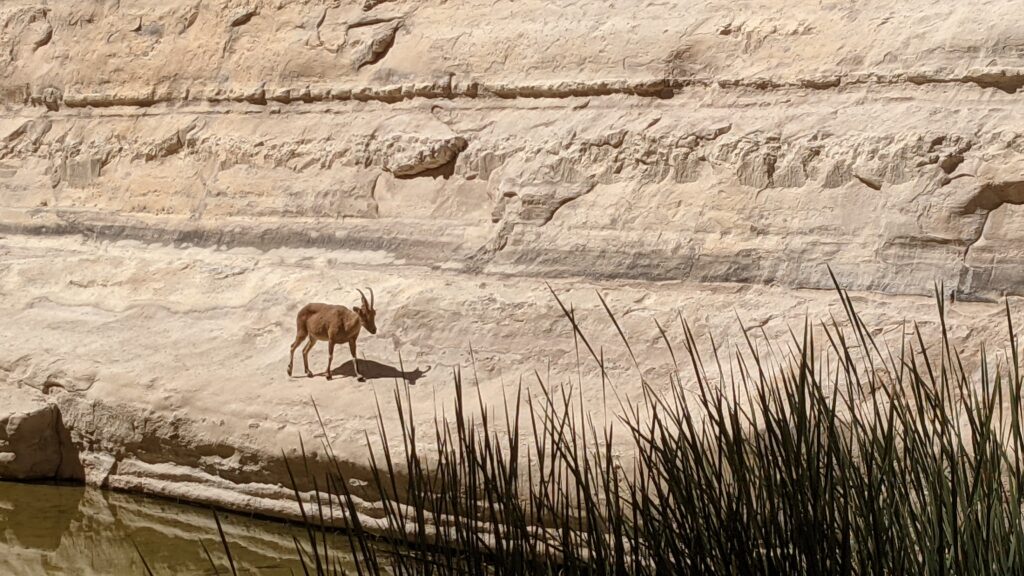
An Ibex 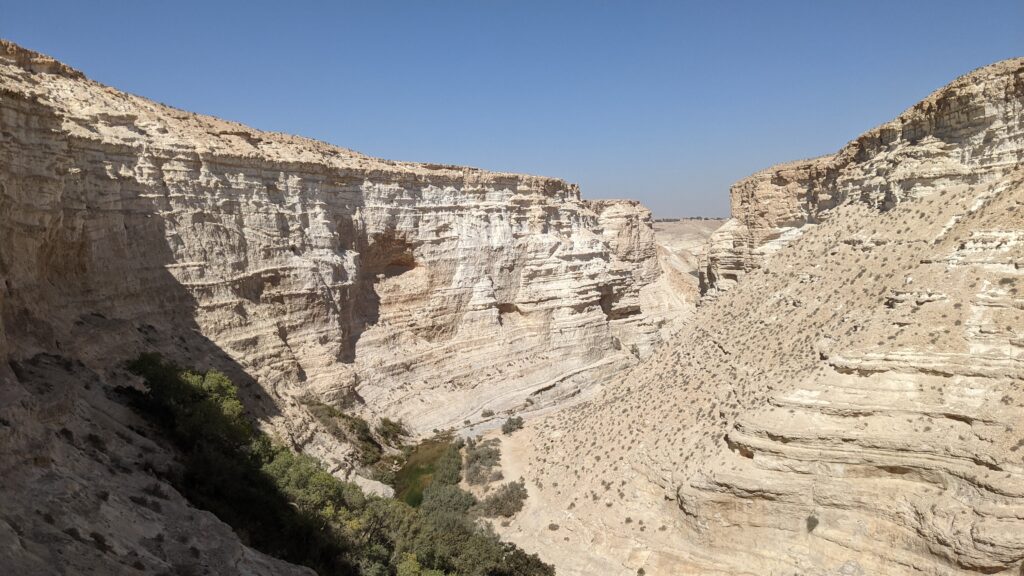
Wilderness of Zin Canyon 
The Wilderness of Zin
At the Wilderness of Zin, the people of Israel complained about not having any water. Now previously, in the hard granite of Sinai, God told Moses to strike a rock and water would appear. He struck the rock and water miraculously, came out. So the fact that the people of Israel are complaining about lack of water would be annoying, to put it lightly.
Now some of the desert dwelling Bedouin can in some places in wilderness, know where to strike at the softer limestone hills in order to find an underground spring. Let me be clear, the Bedouins’ technique would not work in the Granite Mountains of Sinai. It would however it would work in someplace like the wilderness of Zin.
However this time God tells Moses not to strike the rock, but to speak to it, which would have indeed been miraculous. But Moses has had a rough time recently; the promised land is closed off to them, his authority has been challenged, 15,000 Israelites are dead, and his sister has recently died as well. So Moses doesn’t speak to the rock, rather he calls the people before him and strikes the rock like a Bedouin guide, trying to illustrate to the people that he is a competent leader and he knows what he is doing. Because he takes the credit for himself and does not give any to God, he is forbidden to enter the Promised Land.
God’s promises sometimes take a long time to be fulfilled, and sometimes their fulfillment is delayed, often because we lack the faith and trust in God for us to receive everything he wants to give us. Perhaps the giants in front of us cause us to forget how big our God is. Perhaps our present troubles cause us to complain and forget about the good things God has provided for us. Perhaps we seek our own credit when it is God we should be honoring. If God’s promises are delayed, it is usually our fault not His. Even so, God’s promises will be fulfilled. It might take a while, it might be hard and full of trials, but it is all worth it in the end. It requires patience and faith, and a willingness to follow where God may lead.

Colleen Deeter
Dad
Nancy Williams